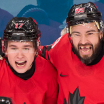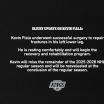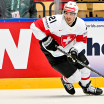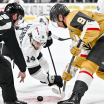With time winding down on the clock, the Kings were down 3-0 to the Red Wings. It certainly looked like LA was going to lose the game and find themselves in a 3-1 series deficit against Detroit, a powerhouse team that finished the season with 111 points.
After that, the Red Wings would make short work of the Kings in Game 5 and that would be that. At least, that's how it looked on paper.
An Oral History of the Frenzy on Figueroa
Key players from the Frenzy on Figueroa recall the game that left STAPLES Center in disbelief
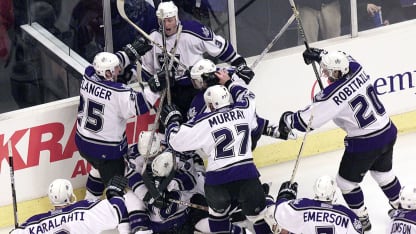
© Robert Laberge
The Kings, however, were not yet down and out. They had been battling through most of the second half of the season just to clinch a playoff berth. After acquiring goaltender Felix Potvin from the Canucks, the Kings went 13-5-5 down the stretch and squeezed into the post-season as a seventh seed.
While they knew they were a better team than their record indicated, they had their work cut out for them taking on a star-studded Red Wings team that boasted seven future Hall of Famers.
After losing the first two games at Joe Louis, the Kings took Game 3 at home with a 2-1 victory. To have a fighting chance in the series, they'd need to take Game 4.
Early into the second period, however, LA was down 3-0. But despite facing a significant deficit in a pivotal game, the Kings didn't give up. They outshot the Red Wings 12-9 that frame and went into intermission with a steeled determination to get on the board and back into the game.
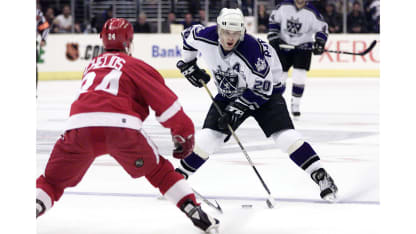
© Robert Laberge
Eric Belanger, drafted 96th overall by the Kings in 1996, playing in his first NHL season: I didn't feel like we didn't have a chance to come back. Sometimes you don't want to show it as a player because you know there's no [expletive] way we can come back, but in the room between the second and the period, we still had the feeling we had a chance to come back.
Felix Potvin, acquired that season from the Canucks and finished the campaign with a sterling .919 sv%: Even in that game being down 3-0. We were playing in LA, the crowd was unbelievable that year. It was my first year, so I didn't really know what to expect from LA but the crowd was awesome. Even down 3-0 you can feel it. Sometimes when you're down in a game and you know the game is over but in this game we could feel that we still had life and we just made our way back from there, one goal at a time.
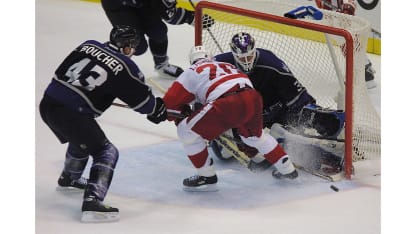
© Robert Laberge
Mathieu Schneider, who won the Stanley Cup with the Canadiens in 1992-93 against the Kings, was playing in his first season in LA. The blueliner finished the campaign with 51 points, his highest total since scoring 52 with the Canadiens in 1993-94: We always talk about how the three-goal lead is the worst lead in hockey because it's such a fine line. What tends to happen is that you get that third and feel a little comfortable and you're not as aggressive and you give your opponent a chance to go on the offensive a little bit more.
Ian Laperriere, had been with the Kings since 1996 since arriving from the Rangers as part of a trade that included Ray Ferraro, Mattias Norstrom, and Nathan LaFayette: We were a younger team playing against a force in the league. We pretty much had a David vs Goliath attitude being down 3-0. We had nothing to lose.
Glen Murray, acquired by the Kings in 1996-97 from the Penguins in exchange for Eddie Olczyk: I think when you're down 3-0, you always think in your mind you can come back to win. The focus was let's get the next goal. If you go down 4-0 the game's over, so let's get the next goal and maybe put them on their heels a little bit.
Bryan Smolinski, in his second season with the Kings. Finished the 2000-01 campaign with 59 points: It wasn't like we weren't getting scoring chances. We were still on our game, it was just a matter of can we break the egg. What was it going to take to score a goal?
With just over six minutes to go, Detroit's Martin Lapointe took a slashing penalty and the Kings went to work on the power play. Ten seconds later, Scott Thomas scored and ended a 0-for-50 playoff power play drought for the club that dated back to 1998. Thomas, who had only played 24 games with the Kings that season, was only in the lineup that night because Steve Kelly was out with the flu. But none of that mattered; the Kings had life.
Philippe Boucher, defenseman in his sixth full season with the Kings: The first goal energized everyone and in the playoffs anything can happen. With that amount of time left that big goal was key and then after that all you need is to push back until the last second and you still have a chance.
GM: We got that goal and we got a little bit of life. You get your legs. You're taking a little bit more chances. Detroit just wants to get that win and move onto the next game.
BS: I think it was after that goal and things just started to turn our way. I think they had taken a few penalties which just kind of, with the emotions of the building and the way things were going, flipped toward our side. We were really coming at them and they didn't have an answer for us. We were clamping down defensively. Cat was awesome. We were starting to really put a push. But time was not on our side.
MS: There was still a fair amount of time left in the game and I think just sticking to the fundamentals when you're in those situations, you're just trying to throw everything at the net and get bodies at the net.
IL: First goal you still felt like you had some hope. We were playing with house money, we had nothing to lose. Losing against Detroit was something everybody expected us to do, but just getting that goal, you get your momentum out of it. We had no pressure of winning or losing because people didn't expect us to do that. We knew we had a better team than people gave us credit for and that's something that the guys fed off of. We knew we were underdogs and we wanted to prove the world wrong.
Less than four minutes later, after another undisciplined play by Lapointe, the Kings scored again on the power play.
GM: We kind of had a little bit of momentum but as soon as we got that second goal, I think we all were up on the bench, excited and knowing they're on their heels. I think that's when we thought we knew we could come back and tie the game up.
FP: You work hard, you work hard and you get down 3-0 and then all of a sudden you happen to make the game 3-2 and in a blink of an eye with our power play. From our perspective we knew we certainly could tie the game up and win it, so it was just a matter of going and keeping the pressure on. It was just holding my part of the bargain because the team had worked really hard and then my goal was to give them a chance to tie that game up.
The Kings kept pushing to tie the game, but time wasn't on their side. It was still 3-2 with less than a minute remaining. As the home crowd collectively held its breathe, the Kings continued to throw everything they had at Detroit's net.
BS: I was standing kind of at the blue line and it came right on my tape. But I couldn't shoot it, I didn't have a lane. So I threw it in the far corner where everybody was. I was holy [expletive], all our guys are in that corner, so I'll throw it over there. Threw it over and Mathieu Schneider, we kind of did an interchange so I threw it in there, I'm a forward so I need to get to the net somehow, someway.
With 53 seconds left, Bryan Smolinski was in the right place at the right time.

© Robert Laberge
BS: The puck went behind the net and I think Murray threw it out front and I gave it a nice drive by kind of through the crease and I was just thinking I'm going to take somebody out and just try to create a little havoc and it literally came right to me. Nobody knew I had it. And I was just like 'hit the net.' It was just kind of a sweeping motion and it hit the middle of the net. I couldn't believe it. Did this really just happen? Did I really just score that goal? It was just unreal.
And then, absolute bedlam. The 18,478 fans at STAPLES erupted into a raucous celebration that the players could feel on the ice.
GM: The fans were absolutely electric. The crowd was absolutely amazing.
MS: Incredible feeling. Up until that point, I don't think I had ever heard STAPLES that loud or seen that intensity in the crowd. It was just an incredible feeling being there. The fans were unbelievable.
BS: It was electric. I've been in some pretty electric buildings and that was probably one of the loudest. Just the circumstances of how we were down three in six minutes to go in the game against the best team in the league.
PB: It was total excitement. You have to try to remain under control because you want to take it to the buzzer and to overtime. Stay under control. The momentum is on your side. The building was out of control.
IL: The atmosphere and the building was special. There's a core group of fans there had been through thick and thin with that team and you could hear them that night when we tied up that game the building was just crazy. I'm sure it's something all the boys remember and I do for sure.
FP: It was crazy. I remember that after every goal you could see it start to get a little louder. 3-1 it was starting to get louder. 3-2 it was starting to get crazy and then at 3-3 it was like we had won the game.
EB: I remember until this day that I was jumping up and down on the bench, everybody was hugging each other. It was unbelievable. And the building was so loud and even until this day, talking about it gives me the chills. It was unbelievable the feeling we had on the bench. You could feel it that we were going to win the game.
After tying the game and forcing overtime, the Kings needed to regroup from all the excitement. They still had a job to do if they were to complete the comeback.
PB: You need to cool down but you want to keep that excitement and momentum. It was on our side in our building. If we were able to stay under control and keep the positive vibe going with our crowd and win that game that we were back into the series.
FP: We just wished we didn't have to come back to the dressing room to make the ice. We wished we could have played the overtime right away
BS: From what I recall, we were in such a playoff mode in the prior month to that because we were fighting for our lives. Once we knew what we were doing, holy [expletive] we just scored three goals. Their backs were against the wall.
GM: You don't even want to go into the locker room. You're watching the clock for the intermission to get back out there and it takes forever. We just had to keep playing the way we were in the third period.
MS: You're going into the dressing room with all that energy and momentum and Detroit is going into the dressing room deflated. They ended up in a situation that should have been a slam dunk win for them and the next thing you know it's completely flipped.
IL: Pressure was on them. Especially us coming back from being down three goals, we were playing with house money. We just kept going. As much as I recall, I don't recall guys having that much pressure just because we came back and the low expectations from everybody, other than us in the locker room. I really, really think the pressure was on them bigtime. To let a lead like that go in the series and in the game.
EB: It was so important for us to just cool down because we were on a high after that goal. Going back in the locker room you kind of lose that momentum and the energy you have after finishing the third period. We had so many good veterans and leadership. I was young, it was my first year in the league. I didn't really know what was going on. It was quiet. At that time, we didn't really have anything to lose. We knew we had the momentum. We just had to believe and keep the pressure on in the overtime period.
Then, with less than three minutes into overtime, rookie Eric Belanger cashed in an Ian Laperriere rebound to win the game.
IL: I put it on net. There was traffic in front so I just put it on net and Belly had the rebound. He was at the right place at the right time and he just put it in.
On this day in 2001, in what would become known as the "Frenzy on Figueroa," the @LAKings recovered from a three goal deficit to force overtime against the Red Wings. Rookie @belly2020 scored the winner in OT to tie the series at two games apiece #Hockey365 #GoKingsGo pic.twitter.com/1BvVzsB0FJ
— Mike Commito (@mikecommito) April 18, 2020
Or so they thought. The officials weren't sure and they went upstairs for a video review.
GM: It went underneath the bar up by the water bottle and came out quickly. He was celebrating but they were pointing over to the timekeeper and they had to review it. It was just mayhem because you think you won but you're not quite sure and they have to review.
MS: The thing I remember most about it is that they weren't quite sure to count it. I think Eric was looking around and looking everywhere because he saw it go in but everybody else was like 'did that go in?' We didn't know if it was a good goal or not.
PB: We all had a feeling it was a good goal. Whatever happened if it was a good call you take it home and try to calm down and get ready for the next game or if it's not a good goal, the momentum was still on our side. But from what I remember we all had a good feeling.
IL: It was just the wait. They had to review it to see if it went in. It was just a matter of when. We knew it went in but it was just the referees reviewing it and I remember everybody jumping around. We thought it was in but it happened so fast out there that maybe you start second-guessing yourself.
EB: Mick McGeough, the ref, wasn't sure. He kind of pointed that the goal was good but afterwards they reviewed it.
After an agonizing few minutes, they confirmed that it was, indeed, a good goal.
EB: That was the longest five minutes of my life. The feeling we had when the goal was allowed was unbelievable.
IL: Belly [Belanger] started jumping around. Something I'll remember forever. Nobody expected us to beat them. Especially coming from behind like that. It was something special.
The Frenzy on Figueroa. RT if you remember this one. @GEICO | #GEICORewind pic.twitter.com/ss8eTKWT6h
— LA Kings (@LAKings) April 9, 2020
With the series now tied 2-2 following such an unlikely win, the Kings started to believe they could vanquish the indomitable Red Wings.
PB: Momentum was big. I think that even for such an experienced team it was hard for them to recover. I think we, as a younger team, needed that confidence. We needed to find it somewhere and that was the key factor for us.
BS: Huge confidence boost to realize that we were a good hockey team. We have, from top to bottom, especially starting in net, Felix was our back bone, we knew that if he was solid we were going to push another very hood hockey team to the brink.
FP: I think at that point it just makes you realize. To that point we believed we could beat them but now we knew we could beat them. It was just a matter of fielding all that energy and making it all positive and trying to finish the series.
EB: It just gave us confidence. We knew at that point we could play with those guys. We knew we could score big goals even if they scored first. Whatever the situation was, we knew we could play with them.
IL: I go back to us being underdogs and nobody saw us there and Detroit was a big machine, they had all the pressure on their side. Andy Murray and Dave Tippett they kept reminding guys that the pressure is on them and let's go out there and play and it paid off and we beat them. Something special to beat a big machine like that.
GM: We knew it was just one game obviously but from that game I think we gained a lot of momentum and a lot of confidence. We were playing a really, really good team and they had the history they had and the Stanley Cups. We believed. I think that game made us believe that we could play with those guys and that we could beat them.
MS: Going back we still felt like we had an awful lot of work to do, you got to come down pretty quickly after being so jacked up after the come from behind win. You've got a tough game going into Joe Louis and we just thought if we could steal one there we'd have a shot and that was just the mindset. We've got to steal a game on the road.
Three nights later, the Kings defeated the Red Wings 3-2 on the road and then, on April 23, they eliminated Detroit from the playoffs with a 3-2 overtime victory at home, picking up their first playoff series victory since 1993.
While the Kings had managed to knock off one of the league's top teams with their strong play throughout the entire series, the catalyst was undoubtedly that improbable comeback victory at STAPLES. Similar to the "Miracle on Manchester" from nineteen years earlier, the game would go on to have a proper name in Kings lore. It would forever become known as the "Frenzy on Figueroa."

